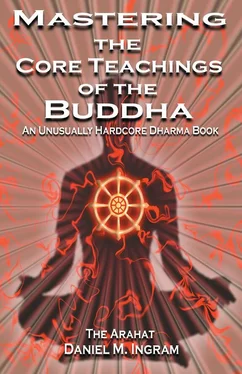Daniel Ingram - Mastering the Core Teachings of Buddha - An Unusually Hardcore Dharma Book
Здесь есть возможность читать онлайн «Daniel Ingram - Mastering the Core Teachings of Buddha - An Unusually Hardcore Dharma Book» весь текст электронной книги совершенно бесплатно (целиком полную версию без сокращений). В некоторых случаях можно слушать аудио, скачать через торрент в формате fb2 и присутствует краткое содержание. Год выпуска: 2009, ISBN: 2009, Издательство: Aeon Books, Жанр: Старинная литература, на русском языке. Описание произведения, (предисловие) а так же отзывы посетителей доступны на портале библиотеки ЛибКат.
- Название:Mastering the Core Teachings of Buddha - An Unusually Hardcore Dharma Book
- Автор:
- Издательство:Aeon Books
- Жанр:
- Год:2009
- ISBN:9781904658405
- Рейтинг книги:5 / 5. Голосов: 1
-
Избранное:Добавить в избранное
- Отзывы:
-
Ваша оценка:
- 100
- 1
- 2
- 3
- 4
- 5
Mastering the Core Teachings of Buddha - An Unusually Hardcore Dharma Book: краткое содержание, описание и аннотация
Предлагаем к чтению аннотацию, описание, краткое содержание или предисловие (зависит от того, что написал сам автор книги «Mastering the Core Teachings of Buddha - An Unusually Hardcore Dharma Book»). Если вы не нашли необходимую информацию о книге — напишите в комментариях, мы постараемся отыскать её.
Mastering the Core Teachings of Buddha - An Unusually Hardcore Dharma Book — читать онлайн бесплатно полную книгу (весь текст) целиком
Ниже представлен текст книги, разбитый по страницам. Система сохранения места последней прочитанной страницы, позволяет с удобством читать онлайн бесплатно книгу «Mastering the Core Teachings of Buddha - An Unusually Hardcore Dharma Book», без необходимости каждый раз заново искать на чём Вы остановились. Поставьте закладку, и сможете в любой момент перейти на страницу, на которой закончили чтение.
Интервал:
Закладка:
Use the descriptions of realization that follow to give yourself a general sense of the territory and what tends to need work and investigation. Avoid whenever possible the traps mentioned above, but when you realize you have fallen into them, which is ever so human and common, then accept this, learn from it and laugh! Should you realize that you have failed to heed this advice, that you have bought into some limited definition of yourself as a realized being of some defined rank or level despite the warnings, you can try to deny it for a while, that’s OK.
You can imagine that you are very sure you know “where you are,” as that sort of artificial solidification of reality is common enough. You can get pissed off at yourself, that’s normal. You can beat yourself up if you 259
Beyond First Path (“What Next?”)
think that it will help, though it rarely does. You can get bitter, though such responses tend to wear out their welcome. You can pump yourself up, dwelling on “your” imagined or real successes, though this tends to ring hollow soon enough. You can try to pretend you don’t care what stage or level you have achieved, though eventually this gives itself away.
However, when you feel you are done with these things, accept, learn and laugh! Repeat as necessary and then get back to investigating those sensations.
260
Mastering the Core Teachings of the Buddha
30.MODELS OF THE STAGES OF ENLIGHTENMENT *
Before I discuss the various models, I should begin by saying that this is almost certainly the most easily misconstrued chapter in this book. Further, if you are a big fan of standard Buddhist dogma, I strongly recommend that you stop reading this chapter now and skip to the conclusion of this book. Seriously, I’m about to get quite irreverent again, but in that irreverence are bits of wisdom that are hard to find so explicitly stated elsewhere, so dismiss this chapter at your peril.
The temptation when thinking about enlightenment is to come up with something defined that you can imagine, such as a state or quality of being, and then fixate on that ideal rather than doing the practices that lead to freedom. It is absolutely guaranteed that anything you can imagine or define as being enlightenment is a limited and incorrect view, but these views are extremely tempting just the same and generally continue to be very seductive even through the middle stages of enlightenment. Every possible description of the potential effects of realization is likely to feed into this unfortunate tendency.
Thus, my distinct preference when practicing is to assume that enlightenment is completely impractical, produces no definable changes, and has nothing whatsoever to do with the scopes of the other trainings. This means that I take it as a working hypothesis that it will not make me a better person in any way, create any beneficial mental qualities, produce any states of happiness or peace, and provide no additional clarity into any of the issues surrounding how to live my ordinary life. I have experimented with adopting other views and found that they nearly always get in the way of my insight practices.
A view so easily becomes sacred, and thus the temptation is to not investigate the sensations that make up thoughts about that view, but rather to imitate the ideal expressed in the content of that view. This can seem like practice in fundamental insight, but it is not. I realize that I am not doing a good job of advertising enlightenment here, particularly following my descriptions of the Dark Night. Good point. My thesis is that those who must find it will, regardless of how it is advertised. As to the rest, well, what can be said? Am I doing a disservice by not selling it like nearly everyone else does? I don’t think so. If you want grand
Models of the Stages of Enlightenment
advertisements for enlightenment, there is a great stinking mountain of it there for you partake of, so I hardly think that my bringing it down to earth is going to cause some harmful deficiency of glitz in the great spiritual marketplace.
Bill Hamilton had a lot of great one-liners, but my favorite concerned insight practices and their fruits, of which he said, “Highly recommended, can’t tell you why.” That is probably the safest and most accurate advertisement for enlightenment that I have ever heard. There was a famous old dead enlightened guy (whose name ironically eludes me at the moment), who was known to have said, “I have gained absolutely nothing through complete and unexcelled enlightenment.” A friend of mine thinks it was the Buddha, and it may have been.
Regardless, it is traditional to advertise enlightenment in the negative in the Buddhist tradition and many others, either stating what it is not or stating what is lost at each stage, but it is so very tempting to imagine that
“freedom from suffering” will naturally translate in to a permanent state of mental happiness or peace, and this can tempt one to try to mimic that idealized state. That would be a concentration practice.
Having said all of that, the fact is that the models of the stages of enlightenment are out there and available. Even when they are not explicitly mentioned, they have an obvious influence on how people describe realization. Thus, I have decided to try to work with them so that they might be used in ways that are helpful rather than harmful.
This is more difficult than it may initially sound.
There are days I wish the words for awakening didn’t exist, the models had never exited, and that the whole process was largely unknown to the ordinary person so that it would be less mythologized and aggrandized, thus making conversations about it much more normal and less reaction-producing. I wish we could start over, strip away all the strange cultural and mythical trappings, create simple, clear terms, and move on with things.
There are other days when I think that at least people know it might be possible, even if most of what has been said about it is pretty fantasy-based. My greatest dream is that the current generation of enlightened teachers will go far out of their way to correct the descriptive errors and false promises of the past and lay the groundwork for perpetuation of 262
Models of the Stages of Enlightenment these reforms despite the economic and social pressures to do otherwise. One of the issues holding this back is that unfortunately only a few have gone far enough to see how the vast majority of the golden dreams of enlightenment do not hold up to reality testing. Another is that putting one’s self on an artificial pedestal can be rewarding in many ways. One way or another, the number of voices trying to bring things back in line with what can actually be done is small in comparison to the forces that want to make it into something grand and thus largely unattainable.
Before I get too far into the details, I should explain that the most essential principle I wish to drive home is that THIS IS IT, meaning that this moment contains the truth. Any model that tries to drive a wedge between the specifics of what is happening in your world right now and what awakening entails needs to be considered with great skepticism. With the simple exception of the fact of poorly perceiving the sensations occurring now and habitually coming up with the illusion of a separate, continuous individual, nearly all of the rest of the dreams are problematic to some degree. This basic principle is essential to practice, as it focuses things on the here and now, and also happens to be true. Back to the complexities…
The mental models we use when on the spiritual path can have a profound effect on our journey and its outcome. Most spiritual practitioners have never really done a hard-hitting look at their deepest beliefs about what “enlightenment” means or what they imagine will be different when they get enlightened. Many probably have subconscious ideals that may have come from sources as diverse as cartoons, TV
Читать дальшеИнтервал:
Закладка:
Похожие книги на «Mastering the Core Teachings of Buddha - An Unusually Hardcore Dharma Book»
Представляем Вашему вниманию похожие книги на «Mastering the Core Teachings of Buddha - An Unusually Hardcore Dharma Book» списком для выбора. Мы отобрали схожую по названию и смыслу литературу в надежде предоставить читателям больше вариантов отыскать новые, интересные, ещё непрочитанные произведения.
Обсуждение, отзывы о книге «Mastering the Core Teachings of Buddha - An Unusually Hardcore Dharma Book» и просто собственные мнения читателей. Оставьте ваши комментарии, напишите, что Вы думаете о произведении, его смысле или главных героях. Укажите что конкретно понравилось, а что нет, и почему Вы так считаете.












